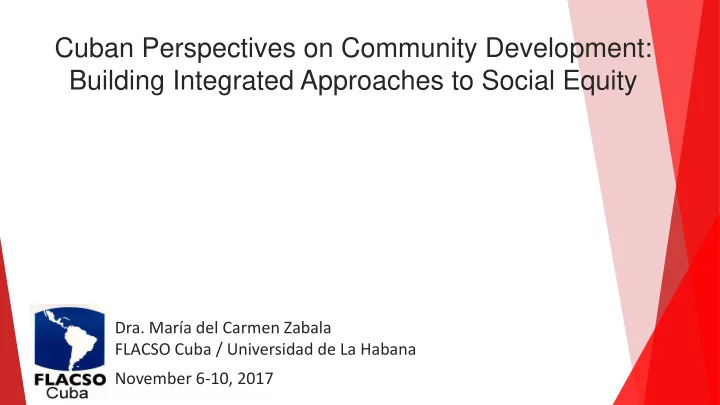

Cuban Perspectives on Community Development: Building Integrated Approaches to Social Equity Dra. María del Carmen Zabala FLACSO Cuba / Universidad de La Habana November 6-10, 2017
Community Development in Cuba Role of Community Development throughout the revolutionary process (1959-present) Creation of local government (Popular Councils) in 1992 Integrated Group for Community Development at the government level (1996) Strengthening participatory local governance (Guidelines for Economic and Social Policy, 2012)
Community development in Cuba STRENGTHS: WEAKNESSES: Equity and Social Justice Local actors and programs work in silos Government Support Predominance of disconnected Social Participation approaches Social Institutions and Poor inclusion of equitable Organizations approaches in local development agendas Human and Social Capital Centralized-top down culture Solidarity and Shared Meaning Cultural Identity and Traditions Lack of reflection and evaluation of community development practices and culture
Theoretical-methods Participatory Action Research Popular Education Community Psychology Sociocultural Animation Community Planning and Development Sustainable Development Local / Community Development
Approaches to theories and methods Holistic and integrated transformation Social justice, inclusion and well-being Participation and empowerment Horizontality, synergy and democratic process Knowledge dialogues Collective construction of knowledge Practice - reflection - new practice Articulation of actors and actions Emphasis in development of people Endogenous and sustainable development
Characteristics of community development in Cuba Incremental growth of experiences, actors and places Diversity of approaches Sociocultural development programs Comprehensive Neighborhood Transformation Workshops Historic Center of Havana Educational and university extension projects Social work Multiplicity of actors and social structures Different levels of social participation
Historical Center of Havana
Experience of FLACSO Cuba Aspects of equity and community development Social justice Equal access to opportunities, resources, welfare, results Recognition of diversity and differences among people Treatment on social disadvantages
FLACSO role in Community Development Coaching/Workshops on Integrated Neighborhood Transformation Academic programs and courses-workshops Community program for children with social disadvantage Social inclusion project for people with disabilities Innovative Management of local development for Strengthening Social Equity
15 Municipalities of the Island
Courses / workshops: Social Development and Equity Gender equality Gaps by skin color Disability and social inclusion Equity and age groups Equity and education, cultura @ information
Design methodological tools Manual of methodological tools for evaluating development projects with an equity approach Validation of the manual and training of actors
Multimedia Social Development and Equity
Collection and Dissemination of Best Practices Experiences exchange workshops Network of Graduates of the Master's Degree Social Development Share knowledge and results
Recommend
More recommend